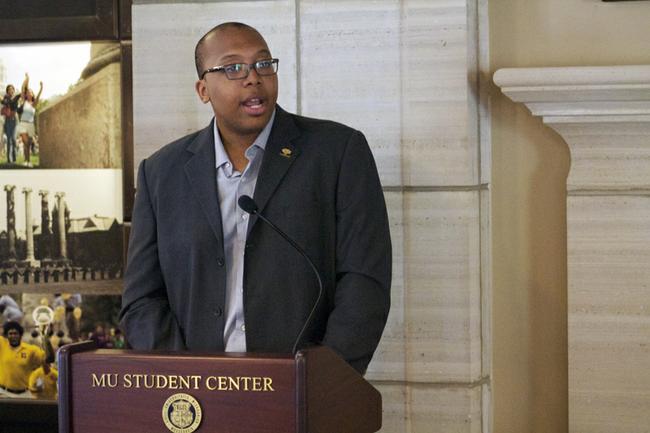Missouri Students Association President Xavier Billingsley gave the first annual Student Agenda Address on Thursday.
“We hope to create a tradition for MSA,” Billingsley said in his speech. “This is an opportunity for us to present plans for the semester and present new projects in upcoming months.”
In Billingsley’s speech, he discussed one of the major initiatives the MSA cabinet has planned.
“We want to remind lawmakers that students need to be a part of the local government process,” Billingsley said.
He cited the success of MSA’s recent campaign More for Less, which fought against a 12.5 percent cut in state funding for MU.
After sending 6,000 letters to Gov. Jay Nixon’s office and 150 people to Jefferson City, Billingsley said the More for Less campaign successfully lowered the funding cuts.
“That is what happens when students and lawmakers stand up for MU,” Billingsley said.
Billingsley also emphasized one of his campaign goals: changing the grading system at MU.
He wants to dispose of the plus/minus system and change to a “flat A” system, as Billingsley called it.
“The current system is unbalanced and unnecessarily lowering GPAs,” Billingsley said in his speech.
Billingsley also discussed numerous programs MSA has planned for the upcoming year.
One of these programs, beginning Oct. 2, is the Tiger Pantry.
The program will benefit those who have difficulties buying food such as “many undergraduates in financial distress, graduate students and staff that need to support families on very low income salaries, and international students that are not allowed to use local assistance programs due to government regulations,” according to the MSA website.
Billingsley said he and MSA members want to ensure these students, faculty and staff receive long-term aid as well.
“It’s not just about handing out food,” MSA Director of Communications Zach Toombs said. “It’s part of a bigger service getting students involved with the Supplemental Nutritional Assistance (Program), (MU) Office for Financial Success and (MU) Student Health Center.”
The program already has 500 volunteers signed up.
To promote diversity, Billingsley and others plan to expand the One Mizzou initiative.
“(MU has) had a number of racially motivated incidents. This is our response to that,” Toombs said.
MSA has planned discussions, lectures and a One Mizzou week. The week would begin Nov. 11 and end Nov. 16 with a concert by a yet unknown performer.
Billingsley said the goal of the week is to promote diversity and acceptance at MU and “gain new knowledge on diversity issues.”
During the speech, Billingsley discussed MSA’s updated bus transportation system, Tiger Line, which began in the fall 2012 semester.
This service features new routes to places such as Walmart, Kohl’s and Greektown. The buses will run every day until 1:30 a.m. and are free for students.
Toombs said that MSA plans to promote the new service by speaking to Greek chapters and other MU organizations.
The most long-term program Billingsley discussed in his speech was advancing the Smoke-Free Mizzou campaign to its final phase.
The campaign is currently on stage two, which limits smoking to designated areas around MU.
Stage one of the program banned smoking within 20 feet of building entrances, according to a 2011 Maneater article.
Stage three of the program creates a completely smoke-free campus. This stage will begin in July 2013, ahead of the originally scheduled date from January 2014.
“MSA wants a smoke-free campus for the health of the students and the community,” Toombs said.
With the implementation of these programs, Billingsley and other MSA members want to promote the well-being of MU students.
“I want to leave a legacy to help students and make their time rewarding at MU,” Billingsley said.








